Search titles
Displaying results 1 to 10 of 383.

Landslide »
The 2025 Australian Federal Election
Publication date: 2026
The 2025 Australian federal election saw an unexpected landslide victory for the Labor Party, the Liberal Party’s worst ever result and the continued rise of the non-major-party vote. In this book, Australia’s leading election analysts explore what contributed to this outcome, including the effectiveness of party and third-party campaigns, the changing demography of the electorate and external factors such as the ‘Trump effect’.
Baby boomers were outnumbered in 2025 by Gen Z and Millennials, who related to politics in a different way. Those pursuing their votes needed to do so through social media; influencers and podcasts became central to campaigning, as did humour appropriating popular culture with the help of AI. Increased cultural and linguistic diversity was also important, and there were new efforts to mobilise Muslim voters over the war in Gaza. Overshadowing it all was Trump. While populist themes seemed attractive at first, association with Trump quickly became a liability, and contributors here examine the difficulty of changing discourses mid-campaign.
This authoritative study is indispensable in understanding the new political landscape: polls and voting behaviour, misinformation, gender issues and competing leadership styles. Richly illustrated, the role of visual politics also receives close scrutiny.
Landslide is the nineteenth in the ANU Press federal election series. The series is sponsored by the Academy of the Social Sciences in Australia.
Coming soon
Notify me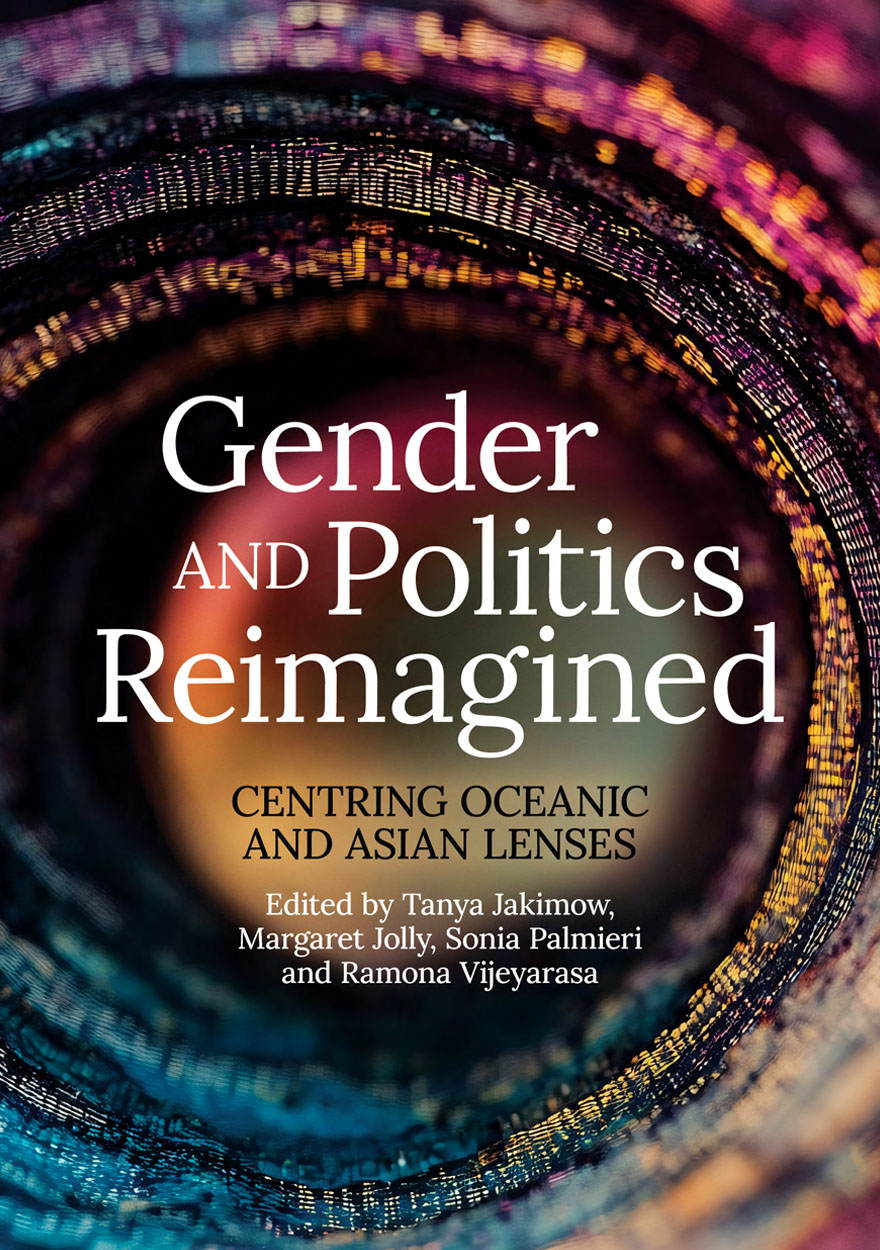
Gender and Politics Reimagined »
Centring Oceanic and Asian Lenses
Publication date: December 2025
This timely collection reflects a coming together of academics, gender and development practitioners and activists to reflect on the gendering of politics. By centring Asia and Oceania and traversing numerous disciplines, the volume disrupts the illusion of certainty and clarity as to what is known about gender and politics. Individual chapters present specific research projects, while providing epistemological, theoretical and methodological reflections on how knowledge is produced and by whom, challenging the existing canon. The contributions collectively demonstrate the possibilities for theorising from Asia and Oceania to address the lack of diversity in political representation and leadership on a global scale, in which gender, race, class, caste, (dis)ability and sexual identity are powerfully interconnected.
Arising out of the Gender and Cultural Diversity in Politics: Australia, Asia and the Pacific workshop held at The Australian National University in 2022, this collection underscores the importance of fostering scholarship and mentorship in the academy. The diversity of authorship encompasses differences in ethnicity, nationality, sexuality and career stage, with an emphasis on the inclusion of authors from various Oceanic and Asian countries. The volume promotes academic practice as integral to social change, and social action as a form of knowledge production. As such, Gender and Politics Reimagined is sure to be a cornerstone in future scholarly and activist discussions.
Format: Hardback
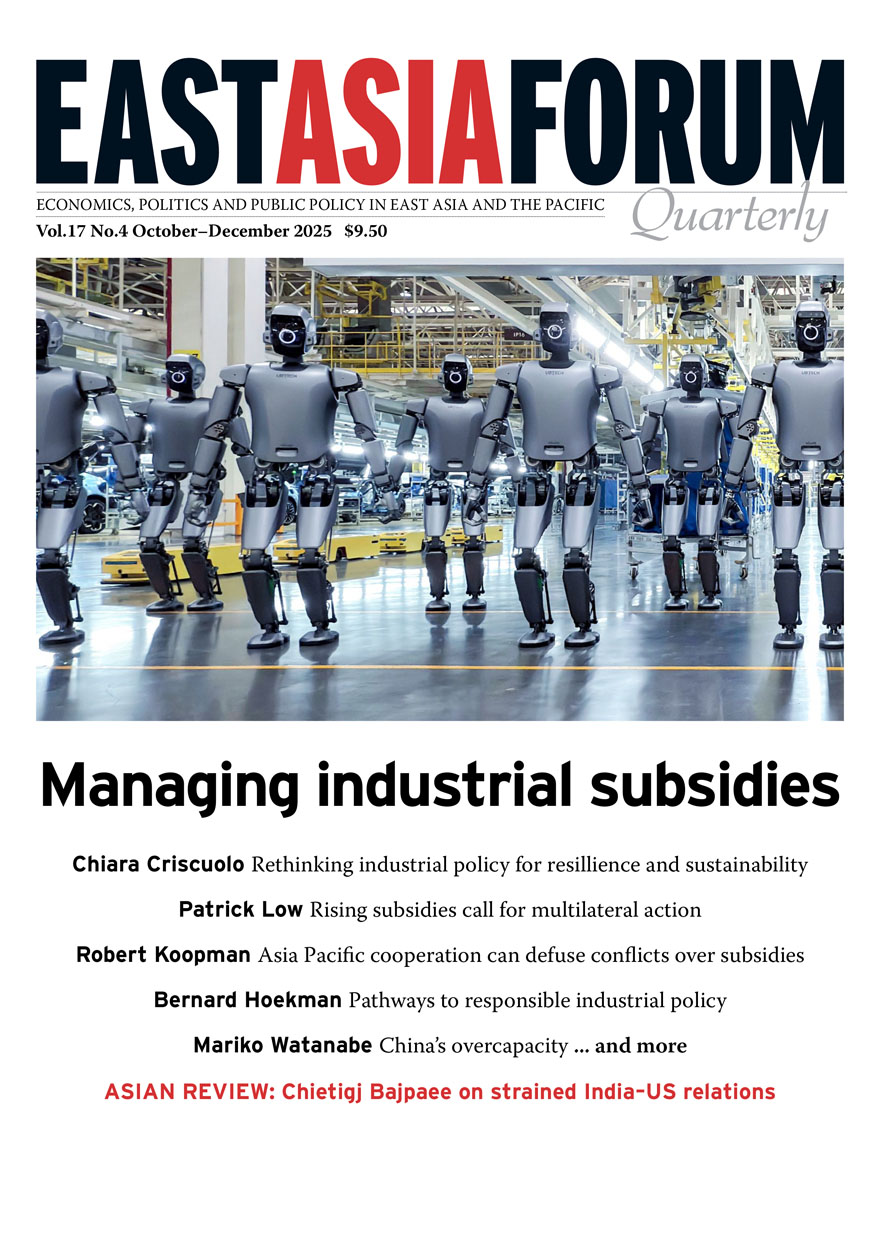
East Asia Forum Quarterly: Volume 17, Number 4, 2025 »
Publication date: December 2025
Industrial policy has returned to the mainstream, with subsidies as an increasingly popular policy instrument of choice. While East Asia is deeply invested in the open global trade regime, multilateral rules are outdated, weakly enforced and ill-equipped to manage the widening gap among countries with unequal fiscal capacity. This issue of the East Asia Forum Quarterly examines the rationale, forms and effects of industrial policy resurgence, identifying both its risks and the conditions for its success. It argues that regional coordination of industrial policy would require greater transparency and peer review, using existing frameworks as well as new plurilateral agreements for that purpose. The region has the platforms and leverage to lead collective efforts to manage industrial policies without undermining the rules-based multilateral order, but whether it can will depend on mobilising the political will.
Download for free
Not available for purchase
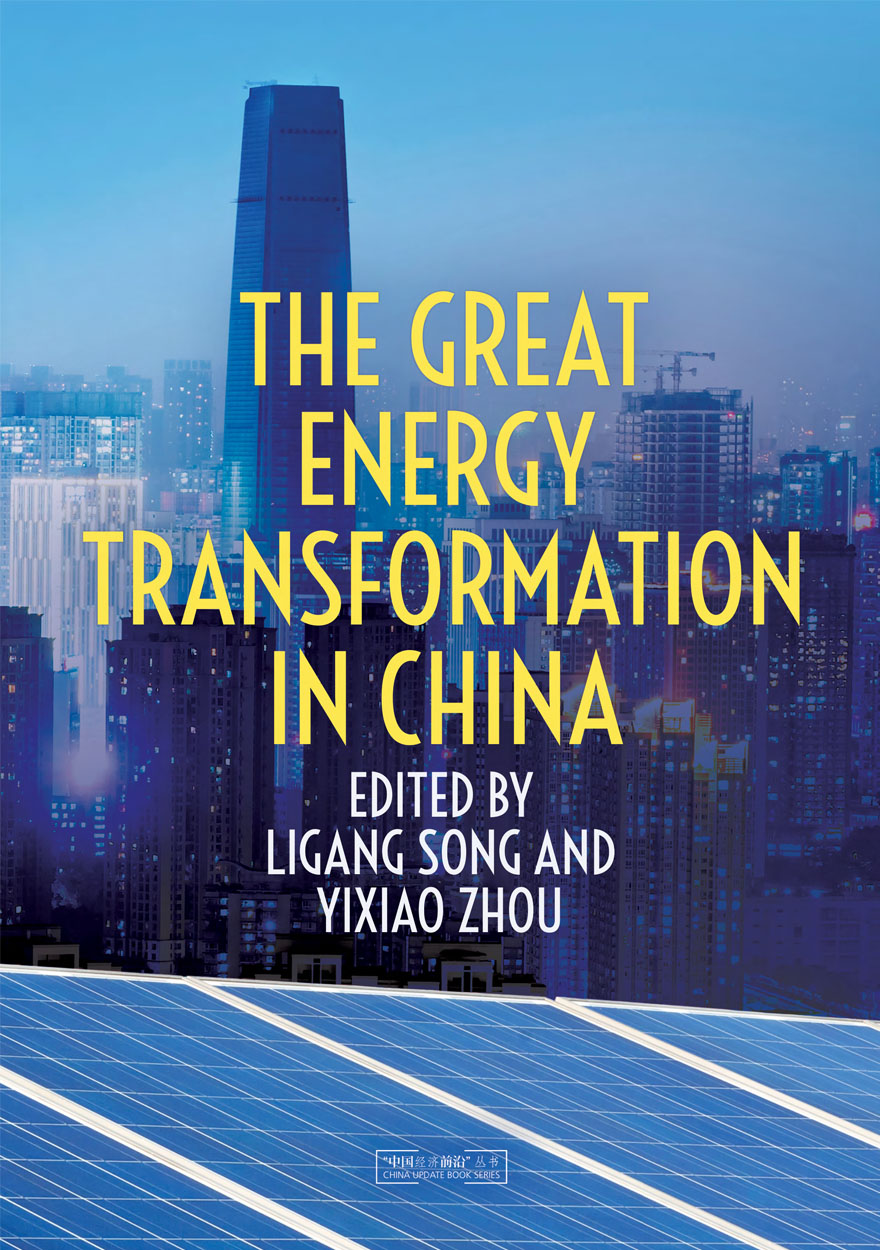
The Great Energy Transformation in China »
Edited by: Ligang Song, Yixiao Zhou
Publication date: November 2025
In 2020, China started the drive to commence a reduction in carbon emissions by 2030 and reach carbon neutrality by 2060, setting in motion a transition to a green, sustainable and clean economy. China has ambitiously developed clean energy alternatives to coal. This transformation encompasses multifaceted strategies ranging from investment in renewable energy and the development of low-emission technologies to more stringent policy regulations on emissions. Renewable energy sources like hydroelectric power, wind, solar and biomass have received substantial attention and investment, with China emerging as a global leader in renewable energy capacity.
In the technology space, China’s transitioning to electric vehicles (EVs) has catalysed the development of a robust EV market, fostering innovation in battery technology and charging infrastructure. China has now become the largest exporter of EVs in the world market. These developments have the potential to materially help curb the world’s carbon footprint and mitigate environmental degradation.
Nevertheless, challenges persist domestically, including the need for grid modernisation to accommodate intermittent renewable energy sources and addressing the socio-economic impacts on coal-dependent regions. In the international market, China’s efforts towards a cleaner and more sustainable energy landscape have helped position it as a leader in sustainable economic development. This could enhance trade of green products, the development of global renewable energy and international investments in energy transformation. However, global trade and investment in green technologies and products are faced with rising geopolitical tensions and trade protectionism. This book discusses China’s achievements in its transition towards renewable energies and identifies new opportunities and challenges for deepening energy transformation in China.
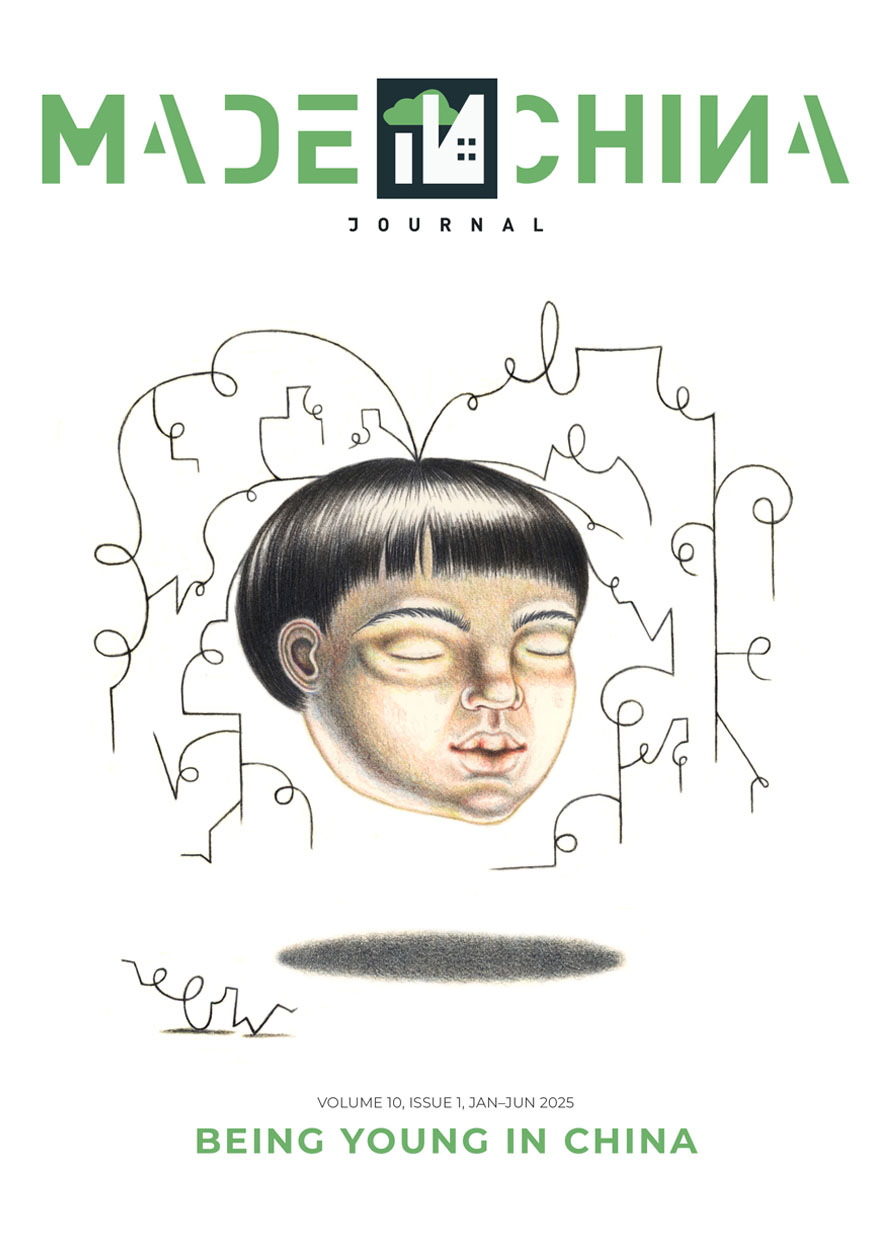
Made in China Journal: Volume 10, Issue 1, 2025 »
Edited by: Ivan Franceschini, Nicholas Loubere
Publication date: October 2025
What does it mean to come of age in a society where the paths to adulthood are increasingly uncertain, yet the pressure to succeed remains relentless? In today’s China, youth navigate the fading promise of reform-era mobility, the grind of economic slowdown, and a moralising narrative that glorifies hardship. Two expressions have come to define this generational mood: neijuan (内卷, ‘involution’), the feeling of being trapped in endless competition with little reward, and tangping (躺平, ‘lying flat’), a quiet refusal to play by those rules. In response to these pressures, young people are experimenting with new ways of living, working, and imagining the future, even as that future grows more precarious. This issue of Made in China Journal explores how these dynamics unfold across schools, homes, workplaces, digital platforms, and creative spaces. Rather than casting youth as rebels or victims, the contributions examine the everyday strategies and compromises that define life under constraint.

Reshaping the State »
Chinese Political Institutions under Xi Jinping
Authored by: Wen-Hsuan Tsai
Publication date: 2025
‘Based on extensive fieldwork and impressive analytic skills, Wen-Hsuan Tsai has produced the most detailed and informative account of the evolving political system in Xi Jinping’s China that I have ever read. It is essential reading for everyone seeking to understand the management and deployment of political power in contemporary China. The book convincingly shows that even though Xi Jinping may have centralized power in his own hands, institutions still matter. Indeed, they are holding China together.’
—Kjeld Erik Brødsgaard, Copenhagen Business School
‘This engaging and thought-provoking academic work reflects the scholar’s dedication to enhancing our understanding of Chinese governance. It blends institutional resonance with leadership dynamics, addressing the knowledge gap in the West about the complexities of the Chinese Communist Party’s resilience and institutions. By examining the idiosyncrasies, risks and challenges of contemporary China—both a major global influence and the world’s second-largest economy—it encourages readers to reflect deeply on its governance and implications.’
—Hon S. Chan, City University of Hong Kong
‘As a leading scholar on China’s elite politics, Dr Wen-Hsuan Tsai reveals how Xi Jinping reshaped the party-state to achieve institutional centralization and made and implemented domestic and foreign policy as the supreme leader of China. This book opens the “black box” of Chinese leadership politics, policymaking and implementation. It is a must-read for anyone who wants to gain deep knowledge about political dynamics in contemporary China.’
—Suisheng Zhao, University of Denver
Coming soon
Notify me
Deeper, Strategic Collaboration in the Securities Sector »
India and Australia
Authored by: Sonia Khosa
Publication date: September 2025
In an era of globalised finance and increasing cross-border activity, regulatory cooperation has become essential for market integrity and development. This book examines the potential for strategic collaboration between India and Australia in the securities sector—two nations with distinct but complementary economic and legal frameworks. Through a comparative analysis of the Securities and Exchange Board of India (SEBI) and the Australian Securities and Investments Commission (ASIC), it evaluates alignment with International Organization of Securities Commissions (IOSCO) principles, focusing on supervisory powers, enforcement mechanisms and compliance effectiveness. The analysis identifies shared regulatory goals and governance principles, highlighting opportunities for bilateral cooperation.
Offering a roadmap for capital market integration and regulatory innovation, the book makes a timely contribution to international financial scholarship. It delivers practical insights for policymakers, legal scholars and regulators interested in forging resilient cross-border partnerships—both within the Indo-Pacific and beyond.
Winner of ANU Press ECR Prize in Legal Scholarship
Format: Hardback
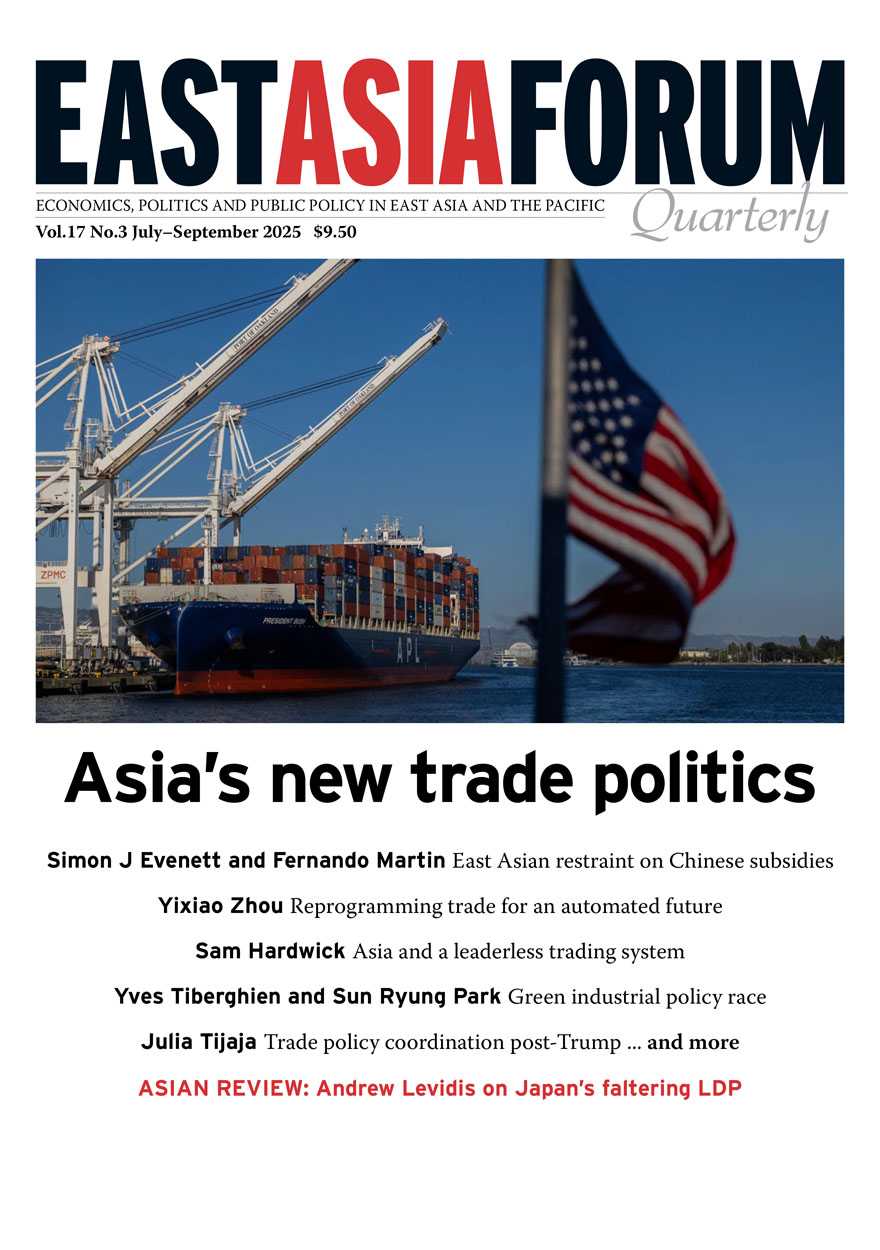
East Asia Forum Quarterly: Volume 17, Number 3, 2025 »
Publication date: August 2025
US protectionism is reshaping Asia’s trade politics. Rising tariffs and unpredictability from Washington are chilling investment, disrupting supply chains and driving governments towards transactional deals that corrode longstanding multilateral rules. This edition of East Asia Forum Quarterly maps the terrain on which Asia must choose between short-term accommodation and long-term growth and resilience. In an increasingly fragmented world, Asia’s best defence is to strengthen institutions to safeguard integration and hunker down behind the multilateral system—while preparing to take a leading role in rebuilding it.
Download for free
Not available for purchase
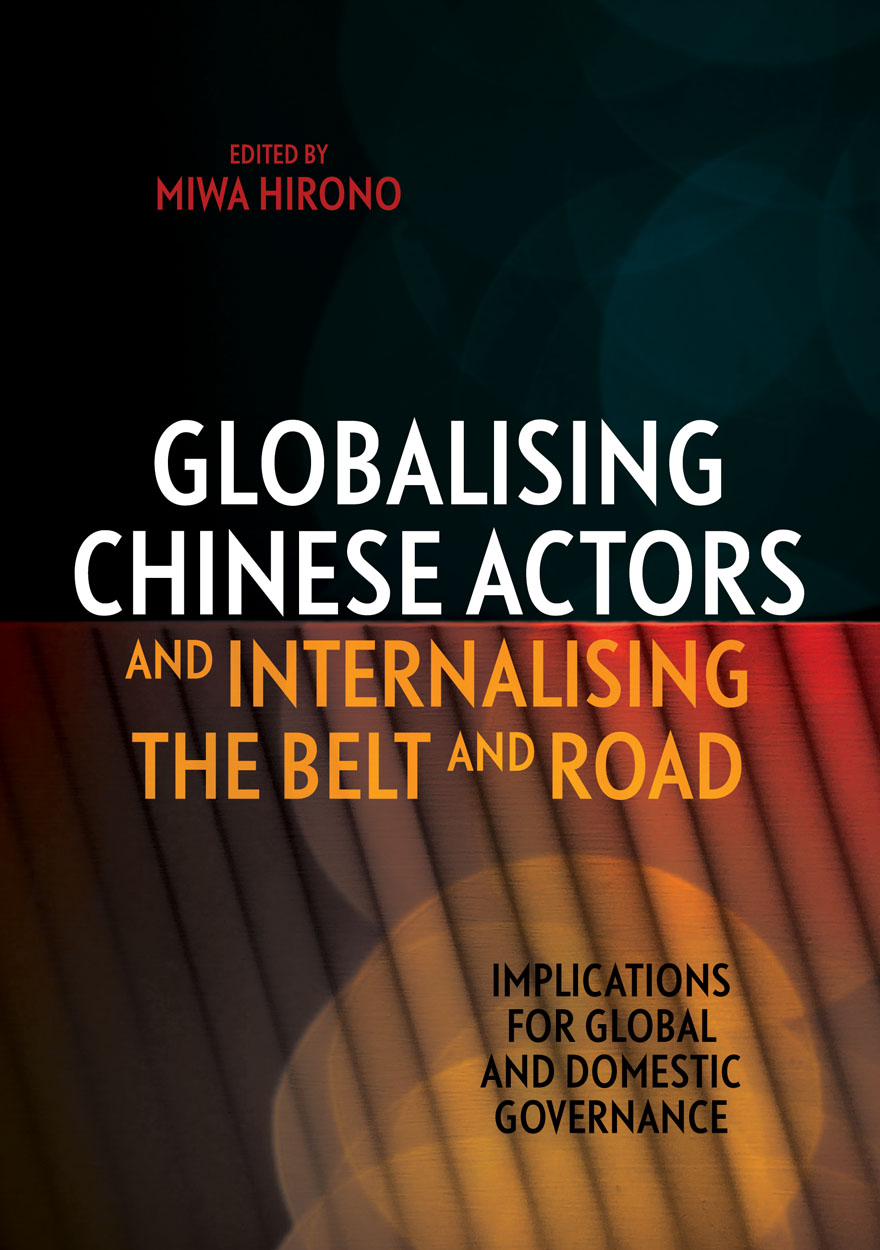
Globalising Chinese Actors and Internalising the Belt and Road »
Implications for Global and Domestic Governance
Edited by: Miwa Hirono
Publication date: June 2025
The literature on the Belt and Road Initiative (BRI) points out either its negative or positive impacts on global and domestic governance. However, such a dichotomy is too simplistic, not least because it tells us little about the complexity of change in the nature of the BRI as it is implemented. This book argues that the BRI manifests an intricate dynamic comprising two contradictory tendencies: Xi Jinping’s top-down and centralised approach to policymaking, with its focus on producing robust Chinese actors who can succeed in a competitive global economy; and a fragmented and decentralised reality made up of an expanding range of actors engaged in realising myriad BRI projects on the ground. The co-existence of these two contradictory tendencies implies that the BRI has a multidimensional impact on global and domestic governance in general, and on the role of Japan in countries where BRI projects take place. Japan matters because of its ‘in-between’ position between non-Western donors and the Development Assistance Committee of the Organisation for Economic Co-operation and Development, a position that offers a unique dimension to a frequently dichotomous discussion of the BRI. Globally, China’s promotion of the BRI has strengthened an aspect of global governance, the ‘open economy’, while at the same time fostering the Chinese nuance of a ‘planned economy’. Domestically, a Chinese-style approach to state management and investment without political conditions may set back democratisation efforts in emerging countries, but the BRI has also given rise to a renewed sense of democracy in those countries. These multidimensional impacts enable China and Japan to find an on-the-ground complementarity in their approaches to development aid in relation to future cooperation.
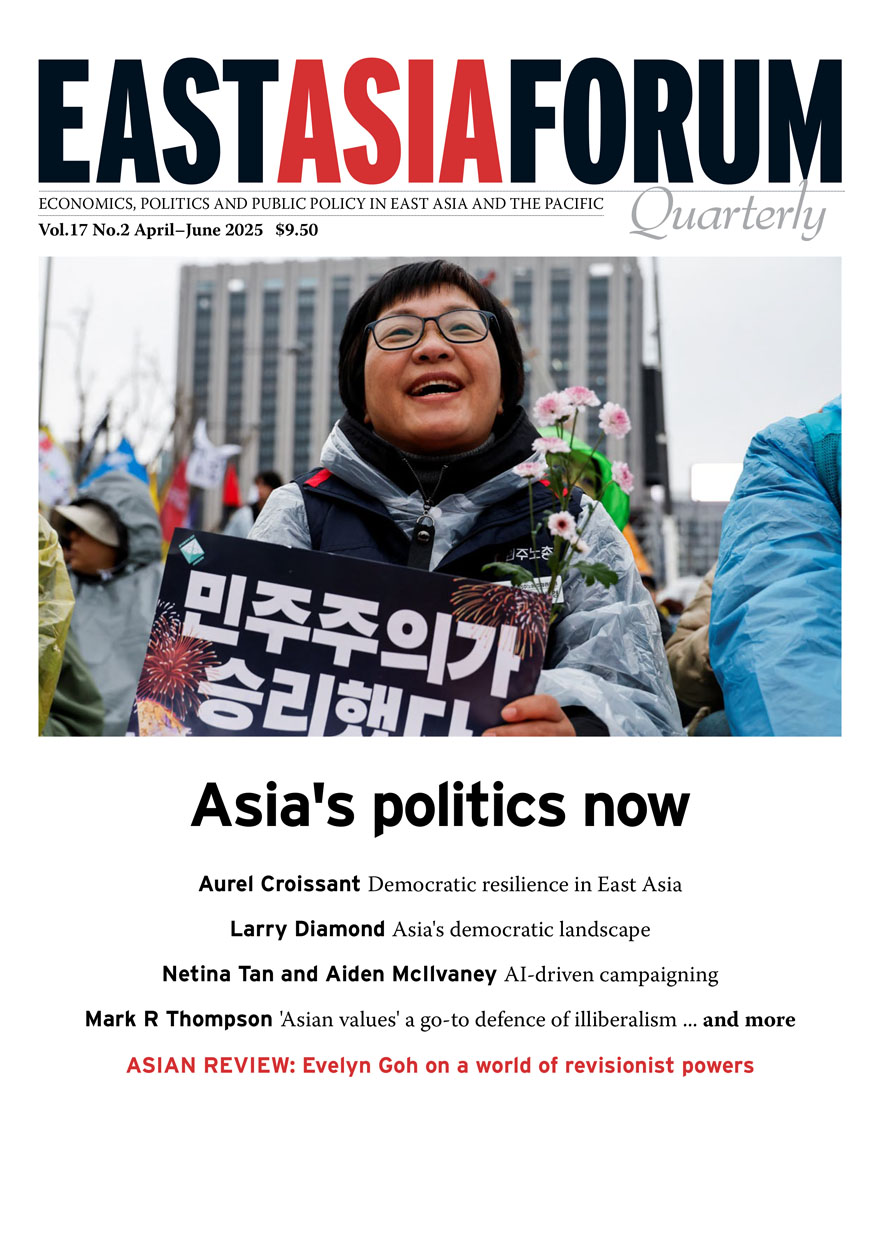
East Asia Forum Quarterly: Volume 17, Number 2, 2025 »
Publication date: May 2025
Asia is home to some of the world’s most diverse political systems—from liberal democracies to authoritarian regimes and hybrid states. As global democracy faces renewed pressure, this edition of East Asia Forum Quarterly explores how political systems across Asia are evolving amid rising autocratisation. It examines why economic development alone cannot explain democratic outcomes in the region and how authoritarian success stories are reshaping debates about governance. With ideological contestation intensifying, Asia is not just adapting to global political trends—it is helping to define them.
Download for free
Not available for purchase



